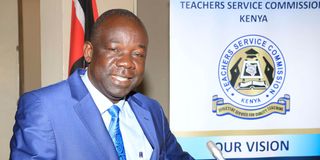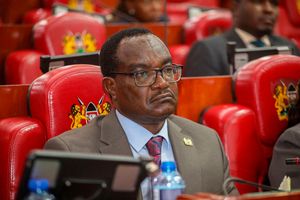
Kisumu County Education Executive and former Kenya Secondary School Heads Association Chairman John Awiti. He says delays in funding could hit Kenya’s economy in the long run.
Frustration is growing in public school headteachers following delayed and inadequate funding by the government.
School managers now say learning and other activities will grind to a halt if the government fails to act in the coming few days.
Some of heads said the much-hyped disbursement by the government amounted to almost nothing.
From as low as Sh87 to Sh4, 000, the school managers found what they call outrageous amounts in the accounts.
“I was notified that Sh87 had been credited to the school account and have confirmed it,” said one head in Nyanza who did not wish to have his name revealed.
“What is Sh87? This means there will be no activities in schools this term. The ministry has followed the disbursement with a circular warning of dire consequences should headteacher ask parents for help. It is time headteachers spoke out loud. We should not die or suffer in silence.”
Another urged the National Assembly and Senate to summon top Ministry of Education officials to explain the situation.

Kenya Secondary Schools Heads Association Chairperson Willy Kuria addresses the media in Mombasa on June 25, 2024
“Let Parliament be made aware. Our learners and parents have rights. School heads have rights too. Budgeting is money, not mere words and promises. How do we work with nothing?” the teacher asked.
The head of a primary and junior school in Seme, Kisumu County, said the institution is fighting for survival.
“Many of our classrooms are in a deplorable state, with holes on floors and broken windows. We do not have enough classrooms for junior school and Grade Seven pupils have little space for learning,” the headteacher said.
The school received slightly more than Sh4, 000 for operations.
“We are expected to run the school with the token. Headteachers do not understand why the Ministry of Education is giving them a hard time,” he said.
Contacted, Nyanza Regional Director of Education, Lawrence Karuntimi, said he was not aware of schools receiving such paltry amounts.
“If true, we will find out from Nairobi where the disbursement was done,” Mr Karuntimi said.
Kisumu County Education Executive, John Awiti said delayed disbursement of funds would compromise quality.

Education Cabinet Secretary Julius Ogamba.
“Education is the foundation of life and should be prioritised in the budget. Taking long to send the money to schools or sending little amounts will definitely have a long term effect on the economy of this country,” said the former principal of St Mary’s School, Yala and who also once chaired the Kenya Secondary School Heads Association.
He urged education stakeholders to address the issue for the sake of learners.
The capitations are categorised into two, one for the tuition and the general-purpose operation.
“The general-purpose account supports staff wages, repair and maintenance, electricity, activity, local travel among others. So, we don’t know where to start with running the school’s day to day operation,” he added.
The Ministry of Education released Sh22.03 billion in capitation funds for Term Two after a three-week delay on May 20, 2025. Education Cabinet Secretary Julius Ogamba said that the funds have been disbursed to facilitate smooth learning activities and ease the financial strain that many schools have faced since the start of the term.
However, the CS did not reveal the amount allocated per learner or whether the amount includes the cash unremitted in Term I. Also, not clear is whether the funds constitute the 30 percent of annual capitation reserved for Term II Mr Ogamba said the amount had been shared across various levels: Sh1.37 billion for Free Primary Education, Sh8.9 billion for Free Day Junior School Education, Sh118 million for Junior School Special Needs Education, and Sh11.6 billion for Free Day Secondary Education.
He noted that the move is expected to ease pressure on school administrators who have been grappling with operational challenges due to funding delays.








